SEO Services vs. PPC Advertising: Which Is Better for Your Business?
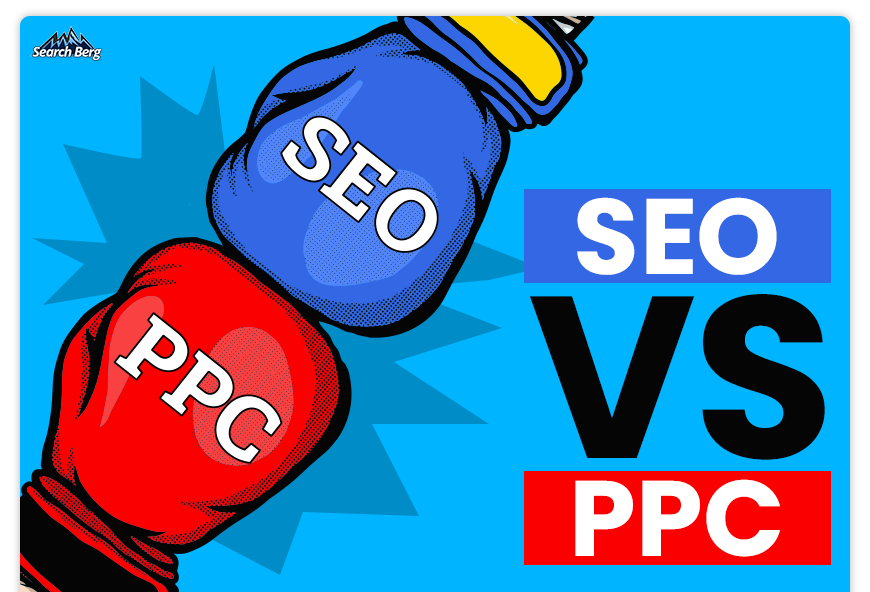
Picture a high-stakes boxing match with two heavyweights duking it out in the ring for the title of your business’ online marketing champion.
In one corner, we have the indomitable search engine optimization (SEO), known for its long-term results and ability to build credibility. In the other corner, we have the swift and targeted pay-per-click (PPC) advertising model, famed for its immediate results and precise audience reach.
As the bell rings, you wait for some pretty heavy punches and a splatter or two of blood. Instead, the two contenders walk towards each other, politely shake hands, and walk away.
Anticlimactic?
Yes.
A more accurate version of reality?
Absolutely.
The SEO services vs. PPC advertising showdown isn’t as dramatic and cut-throat as we’re led to believe. In actuality, both techniques work best when leveraged together.
In this blog, we’ll take a deep dive into the SEO and PPC waters.
- What are the pros and cons of each technique?
- How can you combine SEO and PPC for the best results your business has seen yet?
- What role does Search Berg play in all of this?
Let’s roll out the grand plan!
SEO vs. PPC: The Basics
What is Search Engine Optimization (SEO)?
Search engine optimization (SEO) is the process of tweaking your website to improve its visibility on Google.
Let’s say you run a fitness business and want to rank higher for the keyword “best home workout routines.” To optimize your content for this keyword, you’ll incorporate it into your blogs (title, headings, meta description, image alt tags, etc.) and web copy.
The outcome?
Your business will start showing up among the top search results for this keyword.
This is the power of SEO in a nutshell.
Fast, consistent, and powerful, SEO can help you climb search engine result pages (SERPs) and get seen by your target audience.
Watch this video for more insight into the workings of SEO:
SEO Strategies at a Glance
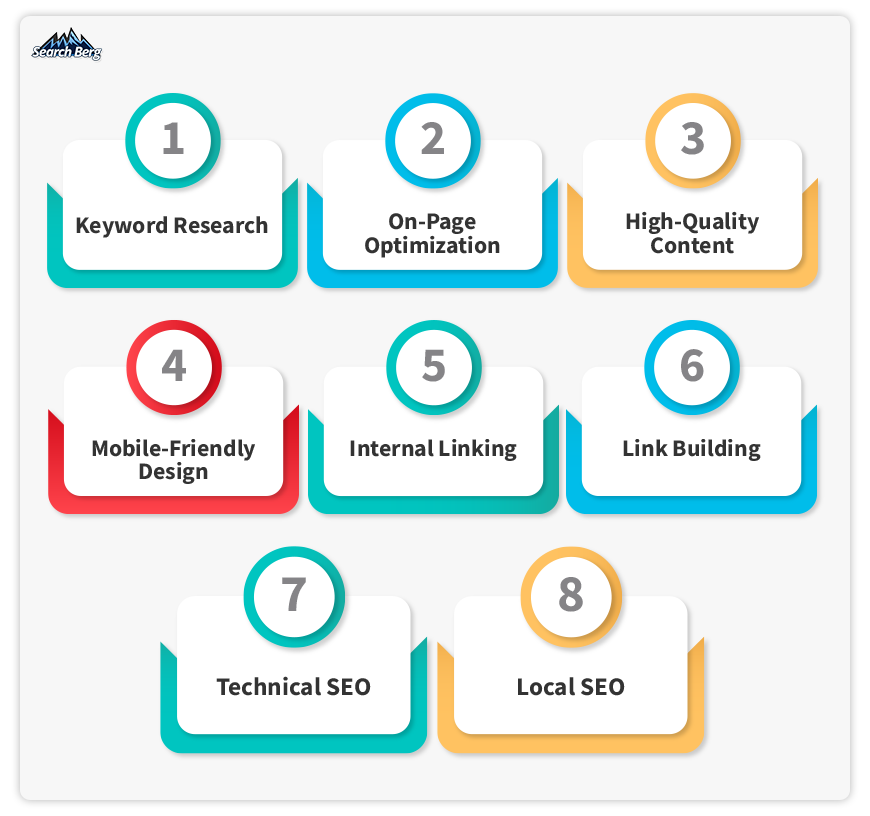
- Keyword Research: Identify relevant keywords and phrases your target audience is actively searching for. Use advanced tools (available at Search Berg) to find keywords with high search volume and moderate competition.
- On-Page Optimization: Optimize your web pages by incorporating target keywords in title tags, meta descriptions, headings, and body text. Ensure that your URL structure is clean and descriptive.
- High-Quality Content: Create informative, engaging, and shareable content that provides value to your audience. High-quality content attracts more traffic, increases user dwell time, and boosts site authority.
- Mobile-Friendly Design: 92.3% of web users access the internet using mobile phones. Mobile searches now account for a significant portion of search traffic. Launch a responsive, interactive, and mobile-friendly website for higher search rankings.
- Internal Linking: Establish a strong internal linking structure to connect relevant content within your website. Internal links help search engines crawl and index your site more effectively. High-quality internal links will also help you enhance user experience.
- Link Building: Build relevant backlinks from websites with a high domain authority (DA) score. Backlinks act as endorsements. When the top dogs provide backlinks to your content, Google will start considering your website a valuable resource by virtue of association.
- Technical SEO: Optimize your website’s technical elements, including site speed, crawlability, and indexability. A well-structured, fast-loading website is more likely to rank higher on SERPs.
- Local SEO: Claim your Google Business Profile listing, use location-specific keywords, and build more customer reviews to reach a wider local audience.
What is Pay-Per-Click (PPC) Advertising?
Pay-per-click (PPC) advertising is a digital marketing model that involves paying a fee each time a user clicks your ad. As an advertiser, you’ll be able to buy ad placements on search engines, social media platforms, and other websites to drive targeted traffic to your site.
Paid ads show up before organic search results on Google. They’re identifiable thanks to the bold “Sponsored” tag.
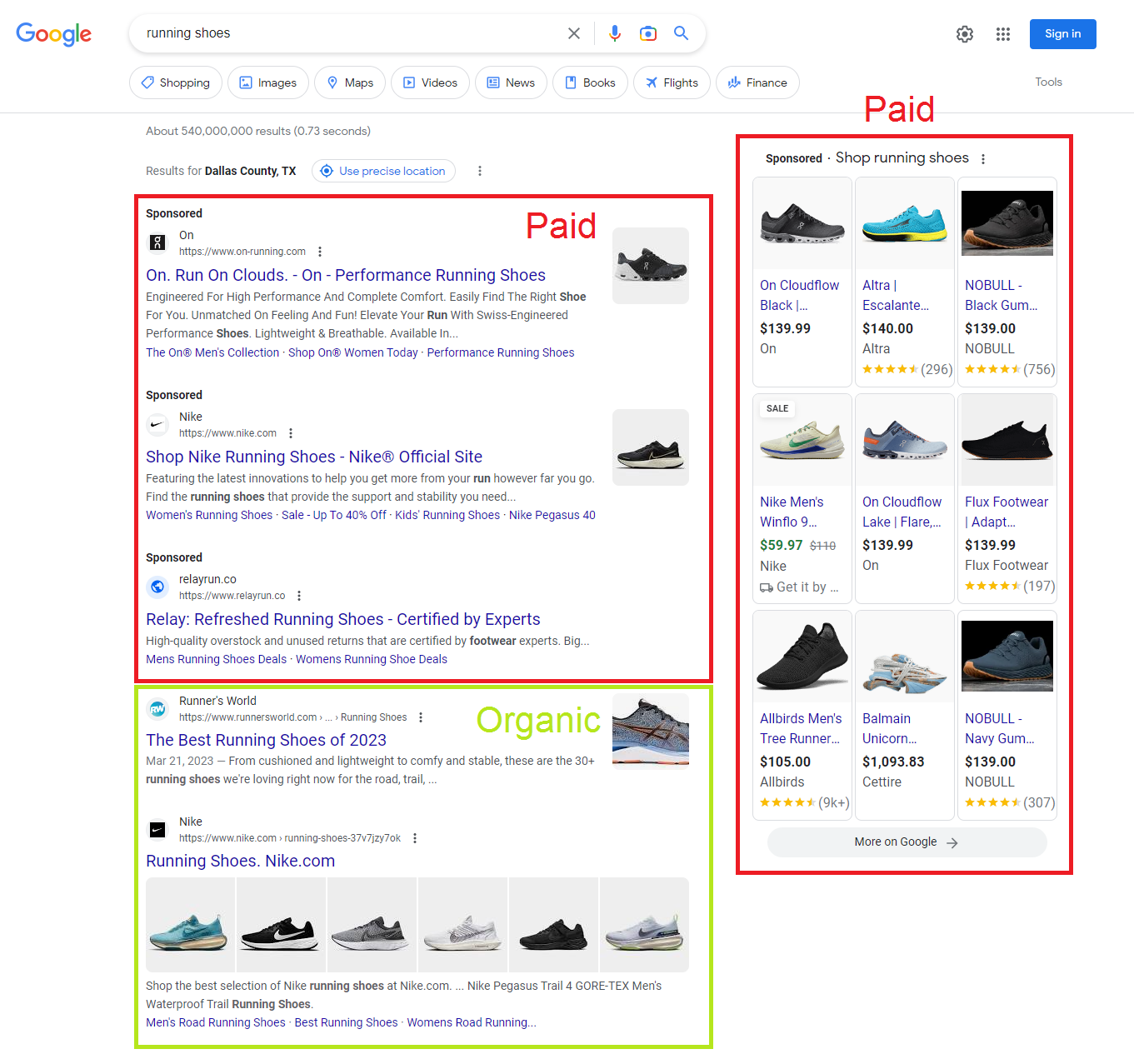
Let’s say you own an online shoe store and want to boost your sales by targeting users who are looking for “running shoes” online.
You’ll start by creating a Google Ads campaign. This will allow you to bid on the keyword “running shoes” and create compelling ad copy that entices users to click on and visit your website.
When users search for “running shoes” on Google, your ad will show up at the top of the search results page. The outcome? High store visibility, a generous stream of clicks, and roaring conversions.
PPC Advertising Techniques at a Glance
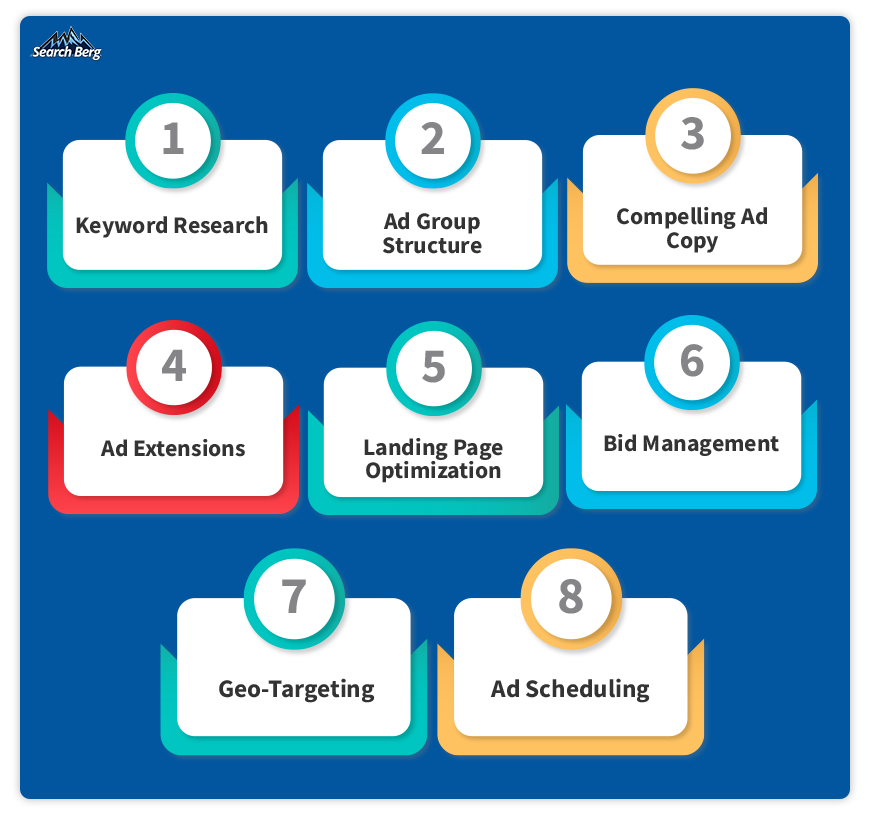
- Keyword Research: Identify relevant keywords that your target audience is actively using when searching for products or services that fall in your industry. Focus on keywords with high commercial intent to maximize your ad spend.
- Ad Group Structure: your PPC campaigns into tightly-themed ad groups with specific keywords. This is a great way to ensure your ads and landing pages are relevant to the user’s search query.
- Compelling Ad Copy: Write engaging ad copy that clearly communicates your value proposition and includes a strong call-to-action (CTA). This will encourage users to click on your ad and complete the desired action.
- Ad Extensions: Use ad extensions such as sitelinks, callouts, and structured snippets to provide additional information and enhance ad visibility.
- Landing Page Optimization: Create relevant, user-friendly landing pages that match your ad copy and provide a seamless experience to users. Optimized landing pages help reduce bounce rate and increase conversions.
- Bid Management: Monitor and adjust your keyword bids to optimize your ad spend and achieve the desired ad position. Consider using automated bidding strategies like Target CPA or Target ROAS to achieve specific performance goals.
- Geo-Targeting: Target specific geographic locations to reach your local audience and optimize your ad spend.
- Ad Scheduling: Schedule your ads to run during specific days and times when your target audience is active, online, and engaged.
SEO and PPC Services Both Sound Great. So What’s the Fuss About?
Why are SEO and PPC pit against each other? Both services have a lot to offer in their own ways. So what’s the fuss about?
Let’s understand this better. Like no economic model is perfect, no online marketing approach is a paragon in any way. Both SEO and PPC have their strengths and shortcomings. Marketing specialists often pick favorites and confuse businesses that are new to the online marketing waters. This is where things get messy.
Instead of picking between SEO and PPC, small businesses must master the art of playing to the strengths of each technique.
Pick out the fresh fruit from both baskets, discard the spoilt pieces, and whip up a delicious SEO and PPC smoothie.
Let’s explore the pros and cons of SEO and PPC to give you a better understanding of the right way to combine these models.
The Pros of SEO: The Good, the Great, and the Excellent
1. Long-Lasting, Evergreen Charm
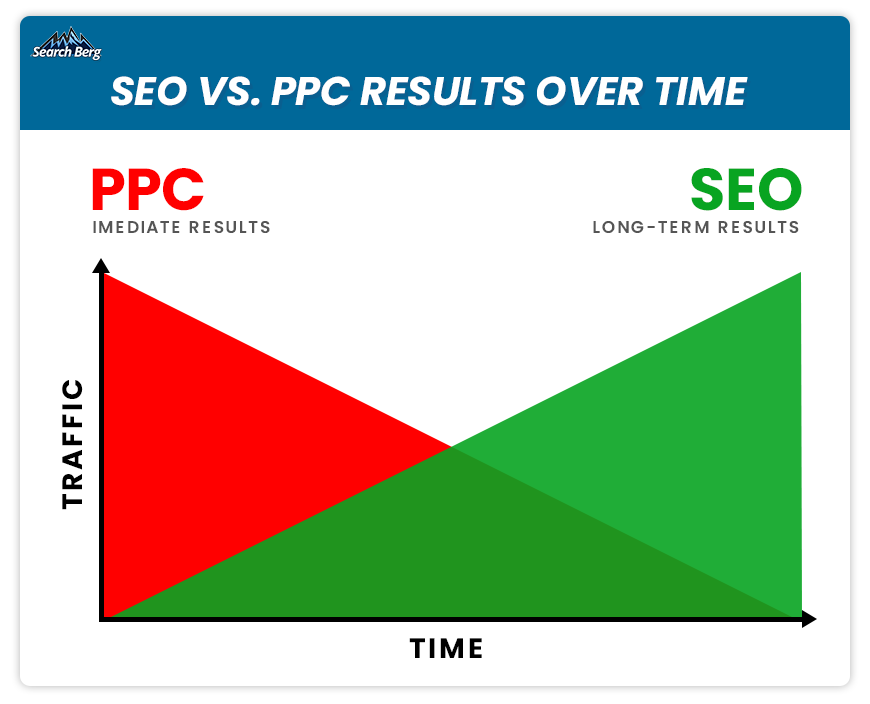
The beauty of SEO is that its effects are long-lasting. Unlike PPC ads, which disappear as soon as you stop paying for them, the results of a power-packed SEO strategy can last for months or even years.
And who wouldn’t love a marketing strategy that keeps on giving?
If you want to capitalize on SEO’s evergreen charm, take things quite literally: start creating evergreen content. This type of content remains valuable, relevant, and informative over an extended period of time, regardless of seasonal trends and industry changes.
Since the content is evergreen, it’ll continue to attract organic traffic for years to come.
Some examples of evergreen content formats include:
- How-to guides or tutorials
- Frequently asked questions (FAQs)
- Lists or resource compilations
- “Ultimate” guides or in-depth analyses
- Case studies or success stories
- Educational or informative articles about a specific topic or industry
If you want to play to SEO’s strengths, jump on the evergreen bandwagon.
If you sell gardening equipment, write a blog titled “The Ultimate Guide to Growing Your Own Vegetables at Home”. This is an example of an evergreen blog because the content isn’t subject to change over time.
If you run a finance business, opt for an article titled “10 Timeless Tips for Saving Money and Reducing Debt”.
Work in health and fitness? How about “The 7 Most Effective Body weight Exercises for Building Strength and Muscle”?
You get the idea.
Every month, sprinkle some evergreen titles over your content plan that aren’t based on local events, holidays, or trends. This will keep you on the first SERP for years to come, not just a handful of days (provided that your content is actually good and well-optimized, of course).
2. The Free Traffic Fairytale
SEO is often referred to as “free” traffic. Of course, there’s no such thing as free traffic. However, once you invest in a solid SEO strategy, the ongoing cost of maintaining it will be relatively low compared to other marketing approaches (we’re looking at you, PPC).
3. Trust and Credibility
Once you’ve built trust and credibility, it’s game over. You’ll have the power to sweep potential customers off their feet and win their hearts. Investing in SEO is a great way to establish your brand as an authoritative, trustworthy, credible, and reputable name in your local industry.
Users tend to trust organic search results more than paid advertisements. In general, people perceive organic results as more reliable and relevant to their search queries.
Why?
Because these websites have earned their rankings through quality content and optimization rather than paying for visibility.
SEO is a long-term strategy that helps businesses rank consistently in search results. Consistent visibility increases brand awareness and demonstrates stability and reliability.
Since PPC campaigns are time-bound, your ads will only appear when you actively pay for them. This can make your online presence appear more sporadic and less trustworthy in the eyes of potential customers.
The Cons of SEO Services: The Game of Patience
1. The Slow and Steady Tortoise
SEO services will not make your business an overnight success story. It takes time, patience, and persistence to see results.
If you want to wake up to stellar SERP rankings, staggeringly high traffic, and enviable conversions, SEO may not be for you.
The process of optimizing your website, building backlinks, and creating high-quality content takes time, and it may be several months before you start seeing significant improvements in your search rankings and organic traffic.
2. The Fickle Nature of Algorithm Updates
Google rarely stays put.
On a mission to get better and better, Google continually launches new updates that can significantly affect your website’s rankings. If you want to ride the SEO waters with ease and adroitness, you’ll have to stay on top of these updates.
This can be a little challenging for small businesses that are new to online marketing.
Since the updates are often rather technical in nature, you may feel overwhelmed and frustrated. If you want to stay on track with SEO, you’ll have to turn to the pros at some point.
Real-Life Example: Canva’s SEO Success Story
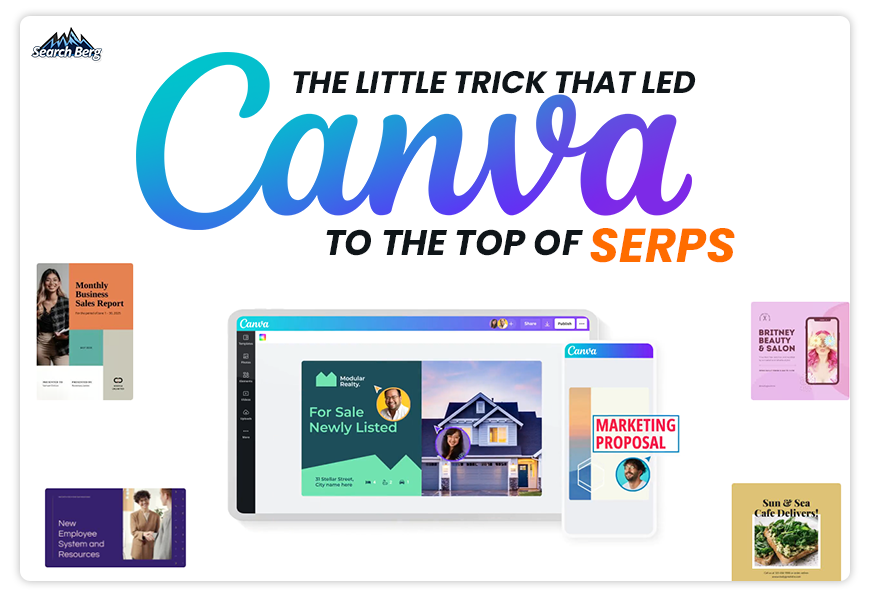
While most people in the online marketing industry recognize Canva as a popular graphic design platform today, it hasn’t always enjoyed the same success.
Like any other business, Canva started off slow and steady. It was founded in 2012 by Melanie Perkins, Cliff Obrecht, and Cameron Adams in Sydney, Australia. Their vision was to make graphic design accessible to everyone, regardless of their skills or expertise.
From the beginning, Canva understood the importance of SEO in driving organic traffic and attracting users to their platform. Their key SEO strategies have been keyword research, high-quality content creation, UX optimization, and social media marketing.
Today, Canva boasts millions of users worldwide and a valuation of over $40 billion. Their mastery of SEO has played a crucial role in helping them stand out in a competitive market, drive consistent organic traffic, and establish themselves as the go-to resource for graphic design.
The Pros of PPC Advertising: The Fast, the Flexible, and the Fantastic
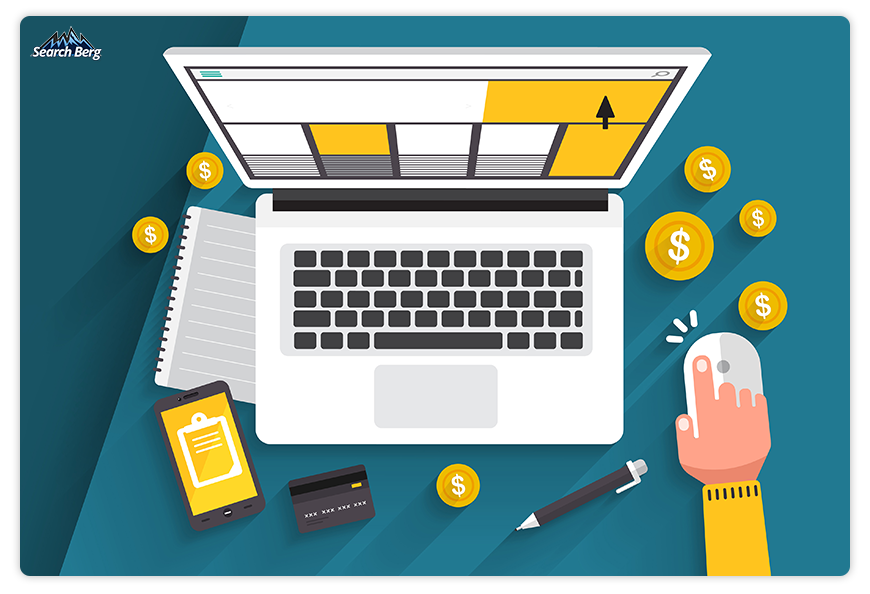
1. The Need for Speed: Instant Gratification
In 2023, time is money.
Yes, slow and steady wins the race, but not everybody has the time for slow and steady.
If you’re short on time and you want to take your business from Point A to Point X in a matter of weeks, PPC marketing is your guy.
Unlike SEO, which can take several months to show noticeable improvements, PPC campaigns start driving traffic as soon as they’re launched. This instant gratification can be especially beneficial in certain scenarios.
Let’s say you run an online store that sells winter clothing, and you want to run a promotion during the holiday season.
PPC advertising will help you create targeted ads for specific products or offers and start driving traffic to your promotion right away. This immediacy will help you capitalize on seasonal trends and limited-time offers without having to worry about the slowness of SEO.
PPC is also an excellent tool for businesses that are launching a new product/service or hosting an upcoming event.
If you need to put word out fast, the PPC model will help you target your ads to a specific audience and reach the right customers in the desired time frame. As you drive immediate traffic to your landing page, you’ll be able to generate quality leads, sign-ups, and even sales in a short amount of time.
While SEO is great in its own right, it doesn’t speed things up the same way.
2. Targeting Precision: The Sniper of Digital Marketing

PPC advertising allows you to target specific audiences with laser-like precision. You can target users based on their location, interests, and even the type of device they’re using. This means you can reach the right people at the right time, maximizing your chances of success.
One of the primary ways PPC advertising achieves precise targeting is through keywords. When setting up a PPC campaign, advertisers select specific keywords or phrases that are relevant to their products/services.
When users search for these keywords, the business’ ads are displayed in the search results.
PPC platforms like Google Ads and Facebook Ads also allow advertisers to target certain demographics (age, gender, location, language, and more). This level of demographic targeting ensures that ads are only shown to users who match the desired profile.
PPC advertising has another trick up its sleeve: behavioral targeting. Advertisers can reach users based on their online behavior, including their browsing history, past searches, interactions with specific websites, and the like.
This is a great way to target users who have already shown interest in your products/services or who have similar interests to your existing customers. The outcome? Stellar conversions.
Jackpot.
3. A Control Freak’s Dream: Complete Command of Your Budget
PPC gives you complete (and we mean complete) control of your ad spend.
You can set a daily, weekly, or monthly budget for your campaigns. This will help you avoid spending more than you can afford.
PPC offers a staggeringly high level of control that’s especially useful for small businesses and startups with limited marketing budgets. You’ll be able to allocate your resources strategically and avoid overspending.
The PPC advertising model has a rather tit-for-tat nature. You only pay when someone clicks on your ad. This makes PPC a cost-effective way to drive traffic to your website.
You can control how much you’re willing to pay per click by setting a maximum bid for each keyword or ad group. This will help you prioritize your spending on high-performing keywords and optimize your campaigns for the best possible return on investment (ROI).
Sweet, right?
If you’re a control freak, chances are you love performance tracking and optimization. PPC platforms provide detailed performance data for each campaign, allowing you to monitor your spending and identify areas for improvement.
By tracking critical metrics (e.g., click-through rates, cost per click, conversion rates, etc.), you can quickly identify which ads and keywords generate the best results.
Use this insight to adjust your budget accordingly. This data-driven approach enables you to optimize your campaigns in real-time and allocate your budget to the most effective strategies.
No wasted effort, no wasted revenue.
Just terrific results.
Recommended Read: PPC Management for Small Businesses: Tips and Tricks
The Cons of PPC Advertising: The Costly, the Competitive, and the Complex
1. The Pay-to-Play Arena
All fun and games? We wish.
PPC can be an expensive game, particularly if you’re targeting competitive keywords. Costs can quickly add up, and if you’re not careful, your return on investment (ROI) can take a hit.
Unlike SEO, which can generate long-term organic traffic with a one-time investment, PPC advertising requires ongoing spending to maintain its effectiveness. You can’t run a PPC advertising campaign for two months, call it off, and expect the results to keep floating around. Not a chance.
If you want to keep driving traffic to your website, you’ll have to continue to invest in PPC.
It’s not all bad news for your pocket. PPC can be affordable if you partner with the right platform. At Search Berg, our PPC services start from $399, which is a far cry from the heavy price tag slapped on conventional PPC plans.
Choose wisely.
2. The Everlasting Battle: Stiff Competition
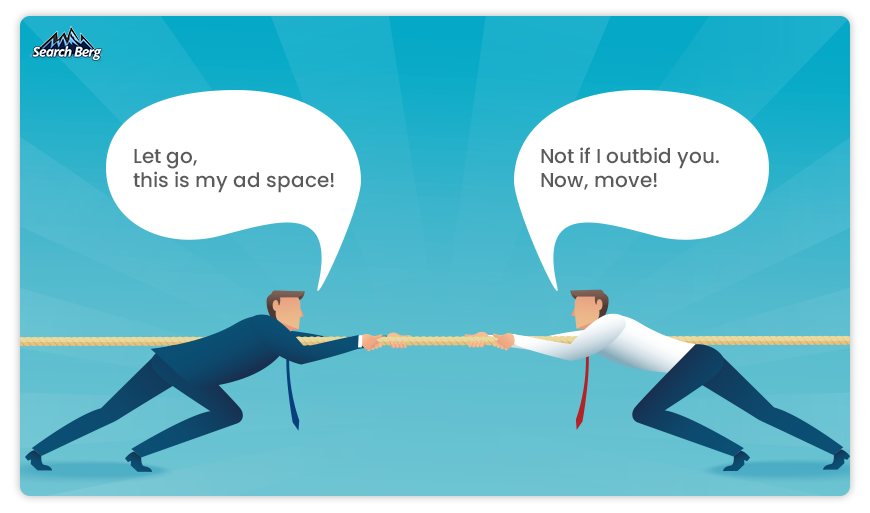
In the world of PPC, you’re constantly competing with other businesses for ad space and attention. This means you need to be on your toes at all times, constantly tweaking and optimizing your campaigns to stay ahead of the competition.
As more and more businesses recognize the benefits of PPC and launch their own campaigns, the advertising landscape will become even more crowded, making it increasingly difficult to stand out, hold your own, and achieve the desired results.
As mentioned earlier, PPC operates on a bidding system; advertisers compete for ad placements based on their bids. As the competition thickens, businesses are often forced to raise their bids to maintain high ad visibility and search rankings.
This can result in escalating CPC costs.
Search engines like Google and Bing also have limited ad space available. As more businesses enter the PPC arena, the competition for these coveted spots intensifies. This can make it more challenging for businesses to secure prominent ad placements.
Real-Life Example: Airbnb’s PPC Success Story
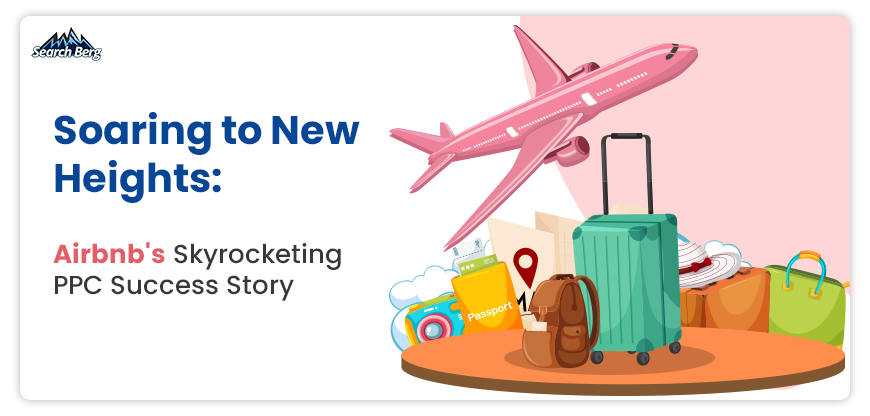
Airbnb, the global online marketplace for lodging and tourism experience, has experienced tremendous growth since its inception in 2008. They used many keys to crack the success portal open, including, of course, PPC advertising.
By leveraging the power of PPC advertising, Airbnb grew its user base rapidly and became the go-to platform for vacation rentals.
When Airbnb first entered the market, it faced stiff competition from established players in the hospitality industry. PPC advertising helped Airbnb quickly gain visibility and reach a broader audience.
By targeting relevant keywords and placing their ads prominently in search results, Airbnb attracted users who were looking for accommodation and converted them into customers. They’ve been doing that since 2008, and the results have been simply spectacular.
Of course, Airbnb had many more tricks up its sleeve. However, its PPC prowess played a big role in helping it get seen online, generate buzz, and captivate audiences.
Today, Airbnb is valued at a whopping $72.3 billion.
Whoosh.
SEO or PPC: What’s Right for My Business?
The answer is simple: both.
Now that you have a better understanding of SEO and PPC, you’ll be able to leverage both models to give your business the visibility, traffic, and rankings it deserves.
When crafting your SEO and PPC campaigns, keep this cheat sheet in mind:
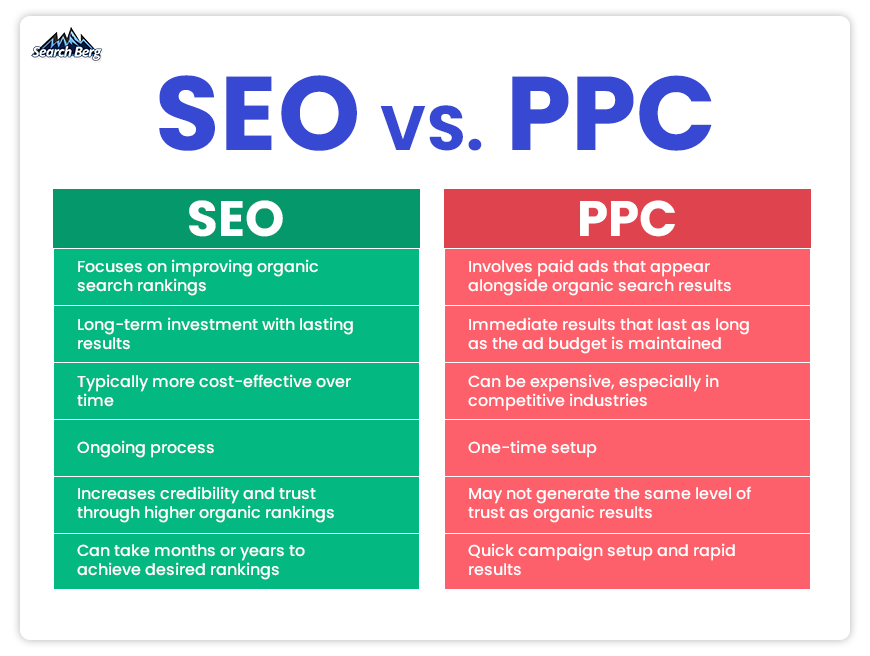
If you want to achieve long-term growth, put more eggs in the SEO basket. This will help you build a strong foundation and establish your brand as an authority in your industry.
If you’re looking for quick results or want to target specific audiences with laser-like precision, put more eggs in the PPC advertising basket.
The truth is that both SEO and PPC can be incredibly effective when used correctly. For most businesses, a smart combinative approach is the best call.
Before you begin, ask yourself the right questions and decide the most suitable course of action accordingly. We’ll help you steer in the right direction.
Question #1: What is your primary goal: building long-term brand visibility or driving immediate results?
- If long-term brand visibility is your focus, lean towards professional SEO services.
- If immediate results are your priority, turn to PPC marketing services.
Question #2: How competitive are your target keywords, and what is your budget for online marketing?
- If competition is high and your budget is limited, SEO is a better option.
- If you have a more flexible budget, PPC can help you compete for high-value keywords.
Question #3: What is the current state of your website’s user experience (UX) and content quality?
- If your website’s UX and content quality need improvement, focus on SEO first.
- If your website is already optimized and equipped with high-quality content, consider investing in PPC.
Question #4: How important is it for your business to maintain a consistent online presence?
- If a consistent online presence is crucial, focus more on SEO.
- If you have specific, time-sensitive campaigns or promotions, PPC might be more suitable.
Question #5: How well do you understand your target audience’s demographics, interests, and online behavior?
- If you have a deep understanding of your audience, PPC service scan help you target them effectively.
- If you need to gather more data and insights about your audience, SEO services can help you reach a broader audience and learn more about their preferences.
Question #6: How much time and resources can you dedicate to managing your digital marketing efforts?
- If you can invest time in creating and optimizing content, SEO is a better fit.
- If you prefer a more hands-off approach and have the budget to pay for ads, PPC is more suitable.
Question #7: How quickly do you need to see a return on your investment (ROI)?
- If you’re looking for a faster ROI, PPC advertising can provide quicker results.
- If you’re willing to invest time and effort for long-term ROI, hire SEO services.
Question #7: How important is building trust and credibility with your audience?
- If trust and credibility are crucial for your business, SEO can be more effective in fostering a positive brand image.
- If you already have a strong, established reputation, PPC can help you maintain that image and reach more customers.
Question #8: How frequently do you plan to update and refresh your website’s content?
- If you can consistently produce high-quality, evergreen content, SEO will be more effective in the long run.
- If you prefer creating content for specific promotions or events, PPC can be a better option for time-sensitive campaigns.
Question #9: What is your level of expertise in digital marketing, and how much support do you need?
- If you’re new to digital marketing and need a more guided approach, SEO can provide a more structured path for learning and improving your online presence.
- If you’re comfortable managing your online marketing efforts and prefer more control over your campaigns, PPC might be more suitable.
Question #10: Are you targeting a specific niche or a broader market?
- If you’re targeting a niche market, SEO can help you rank higher for niche-specific keywords and attract relevant traffic.
- If you’re targeting a broader market with diverse segments, PPC can help you create targeted campaigns for each segment and reach a wider audience.
It’s Time for Action!
In this blog, we offered a complete breakdown of SEO services vs. PPC advertising.
The real competition doesn’t lie between these two strategies; it lies between you and your competitors.
Leverage SEO and PPC to knock out your competition and earn a power-packed boost in online visibility.
Search Berg is ready to make it happen!
We provide professional SEO services and PPC marketing services to give your business the ammo it needs to dominate the web.
It’s time to get seen by your target audience, turn clicks into conversions, and let the revenue come rolling in.
We’re ready when you are!














